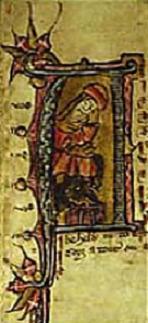William Langland facts for kids
William Langland (born around 1332, died around 1386) is believed to be the writer of a famous poem called Piers Plowman. This poem was written in Middle English, which is an older form of the English language. It uses a special kind of poetry called alliterative verse, where many words in a line start with the same sound.
Piers Plowman is an allegory, which means it tells a story where characters and events represent deeper ideas, often about religion. The poem helped explain complex religious ideas in a way that everyday people, not just church leaders, could understand.
Contents
Who Was William Langland?
Very little is known for sure about William Langland's life. Most of what we think we know comes from clues hidden within his poem, Piers Plowman.
Where Was Langland Born?
It is thought that Langland was born in the West Midlands area of England around the year 1330. In Piers Plowman, the main character has his first dream while sleeping in the Malvern Hills. These hills are located between Herefordshire and Worcestershire. This suggests Langland might have had a connection to that area. Also, the way the poem is written, including its dialect, matches the language used in that part of the country.
Many people believe Langland was born in Cleobury Mortimer, Shropshire. However, other places like Ledbury, Herefordshire, and Great Malvern, Worcestershire, also claim to be his birthplace. In Cleobury Mortimer's local church, St Mary's Church, there is a special plaque and a window from 1875 that show scenes from Piers Plowman. Some even think Langland might have been a young student at Woodhouse Friary, a religious house nearby.
When Did Langland Die?
Many clues suggest that Langland passed away in 1385 or 1386. A note written by someone named "Iohan but" (John But) in an old copy of the poem mentions the author's death. It says, "Death struck him a blow and knocked him to the ground / And now he is buried under the soil." John But himself seems to have died in 1387, which means Langland likely died shortly before that time.
Langland's Life in London
The poem Piers Plowman gives us some hints about Langland's life. In one part, the narrator describes himself as someone who lived in the Cornhill area of London. He also mentions having a wife named Katherine and a child named Nicolette. The poem suggests he was quite tall and earned a living by saying prayers for the dead in special chapels at St Paul's Cathedral.
However, it's important to remember that Piers Plowman is an allegory. This means the lines between real life and the story's meaning can be blurry. So, we can't be completely sure if these details about Langland's family and job are entirely true or part of the poem's fictional story.
Langland and the Church
The poem shows that Langland had a deep understanding of religious topics. This suggests he had some connection to the clergy, which are people who work for the church. However, it's not clear exactly what his role was. The poem criticizes some church practices but doesn't seem to favor any specific religious group.
Some experts believe Langland was an "unbeneficed clerk." This means he was educated in the church but didn't have a permanent position or a steady income from it. He might have traveled around, offering his writing skills in exchange for food and shelter.
Langland and John Wycliffe
In the 1500s, some people thought Langland was a follower of John Wycliffe. Wycliffe was a religious reformer who questioned many church practices. It's true that Langland and Wycliffe shared some similar ideas. Both of them wondered about the value of indulgences (pardons for sins) and pilgrimages (religious journeys). They also believed that sermons should be given in the everyday language of the people, not just Latin. Both also spoke out against corruption in the church.
However, these ideas were common topics of discussion in the late 1300s. They were not only linked to Wycliffe until after Langland's death. Also, Langland's poem does not mention Wycliffe's specific teachings about the sacraments, which were very important to Wycliffe. So, it's unlikely that Langland was a direct follower of Wycliffe.
See also
 In Spanish: William Langland para niños
In Spanish: William Langland para niños
- Pearl Poet
- Piers Plowman
 | Jewel Prestage |
 | Ella Baker |
 | Fannie Lou Hamer |


